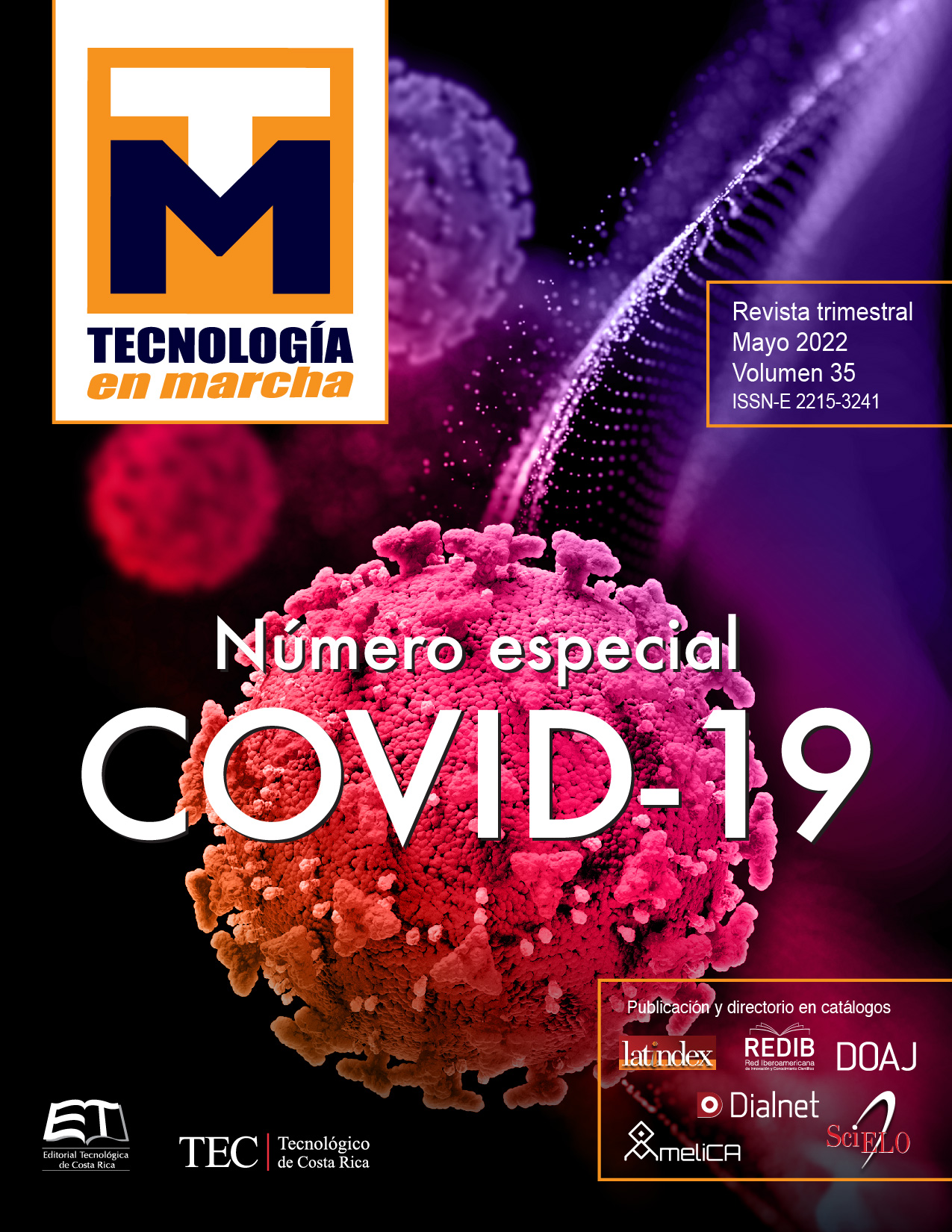Determining factors of the business growth in MSMEs affected by COVID-19
Main Article Content
Abstract
The health crisis caused the SARS-CoV-2 and his disease the COVID-19 has significantly affected companies both nationally and internationally, triggering a series of negative consequences on critical success factors such as sales and hire. The purpose of this research was to analyze the incidence of variables such as the employer gender, age and size of the company, and the support of suppliers in the economic activity of Costa Rican MSMEs in the context of the health and economic crisis. To prepare this study, a database collected by the Ministry of the Economics of Industry and Commerce (MEIC) was used, corresponding to a sample of 2718 MSMEs from the business park. A Logistic Regression Model was used for data analysis, which allowed us to examine the significant statistical relationships of the variables studied. The results support a significant relationship between the company’s size concerning the level of sales and the hiring of personnel. On the other hand, they point out that there is no significant relationship between the gender of the owners or administrators and the age of the MSMEs to the two dependent variables.
Article Details

This work is licensed under a Creative Commons Attribution-NonCommercial-NoDerivatives 4.0 International License.
Los autores conservan los derechos de autor y ceden a la revista el derecho de la primera publicación y pueda editarlo, reproducirlo, distribuirlo, exhibirlo y comunicarlo en el país y en el extranjero mediante medios impresos y electrónicos. Asimismo, asumen el compromiso sobre cualquier litigio o reclamación relacionada con derechos de propiedad intelectual, exonerando de responsabilidad a la Editorial Tecnológica de Costa Rica. Además, se establece que los autores pueden realizar otros acuerdos contractuales independientes y adicionales para la distribución no exclusiva de la versión del artículo publicado en esta revista (p. ej., incluirlo en un repositorio institucional o publicarlo en un libro) siempre que indiquen claramente que el trabajo se publicó por primera vez en esta revista.
References
S. Korsgaard, R. Hund, D. Townsend, y M. Bruun, «COVID-19 and the importance of space in entrepreneurship research and policy», Int. S. Bus. J, vol 38, n.o 8, pp 697-710, 2020, doi: 10.1177/0266242620963942
P. Chowdhury, S. Kumar, y S. Kaisar, «COVID-19 pandemic related supply chain studies: A systematic review», Transp. Res. Part E, 2021, doi: 10.1016/j.tre.2021.102271
A. Janiak, C. Machado, y J. Turén, «Covid-19 contagion, economic activity and business reopening protocols», J. Econ. Behav. Org, vol 182, pp 264-284, 2021, doi: 10.1016/j.jebo.2020.12.016
A. De Masis y E. Rondi, «Covid-19 and the Future of Family Business Research», J. Man. Stud, vol 57, n.o 8, pp 1727 – 1731, 2020, doi:10.1111/joms.12632
M. Dvorak, P. Rovny, V. Grebennikova, y M. Faminskaya, «Economic impacts of Covid-19 on the labor market and human capita», Terra Econ, vol 18, n.o 4, pp 78–96, 2020, doi: 10.18522/2073-6606-2020-18-4-78-96
Y. Liu, J. Min Lee, y C. Lee, «The challenges and opportunities of a global health crisis: the management and business implications of Covid-19 from an Asian perspective», Asian Bus. Man, vol 19, pp 277-297, 2020, doi: 10.1057/s41291-020-00119-x
M. Cowling, R. Brown, y A. Rocha, «Did you save some cash for a rainy Covid-19 day? The crisis and SMEs», Int. S. Bus. J, vol 38, n.o 7, pp 593-604, 2020.
J. Juergensen, J. Guimón y R. Narula, «European SMEs amidst the Covid-19 crisis: assessing impact and policy responses», J. Ind. Bus.Econ, vol 47, pp 499 – 510, 2020.
G. García y L. Guzmán, «Facing post Covid-19 era, what is really important for Ecuadorian SMEs?», Int. J. Eng. Bus. Man, vol 12, pp 1-9, 2020, doi: 10.1177/1847979020971944
A. Al-Fadly, «Impact of Covid-19 on SMEs and Employment», Entrep. Sust.Issues, vol 2, n.o 2, pp. 629-648, 2020, doi: 10.9770/jesi.2020.8.2(38)
R. Brown, A. Rocha, y M. Cowling, «Financing entrepreneurship in times of crisis: Exploring the impact of Covid-19 on the market for entrepreneurial finance in the United Kingdom», Int. S. Bus. J, vol 38, n.o 5, pp 380-390, 2020, doi: 10.1177/0266242620937464
E. Robles, «El caso de Costa Rica: ¿qué sigue para el sistema económico luego de la pandemia?», G. Mayorga López, Entrevistador, Abril 2020.
G.N. Powell y K.A. Eddleston, «Workfamily enrichment and entrepreneurial success: do female entrepreneurs benefit most?», Acad. Man, vol 32, n.o 3, pp 747-760, 2011.
I. Brusca-Alijarde, M. Labrador Barrafón, M.P. Blasco-Burriel, y L. Esteban-Salvador, «Impacto del género y la responsabilidad social en la rentabilidad empresarial cuando se controlan los recursos estructurales e intangibles», Persp. Emp, vol 4, n.o 2, pp 59-72, 2017, doi: 10.16967/rpe. v4n2a6
A. Rodríguez, «Factores determinantes del crecimiento empresarial», Rev. Esp. Finan. Cont, vol 29, n.o 103, pp 257-262, 2000, Retrieved April 1, 2021, from http://www.jstor.org/stable/42781376
K. Chen y R. Li, «Suppliers capability and price analysis chart», Int. J. Prod. Econ, vol 98, n.o 3, pp 301-315, 2005.
C. Araz y I. Ozkarahan, «Supplier evaluation and management system for strategic sourcing based on a new multicriteria sorting procedure», Int. J. Prod. Econ, vol 1, pp. 585-606, 2017.
K. Choy, W. Lee, y H. Lau, «A knowledge-based supplier intelligence retrieval system for outsource manufacturing», Knowledge-Based Sys, vol 19, pp 1-17, 2005.
V. Papadopoulos, L. Li, y M. Samplaski, «Why does COVID-19 kill more elderly men than women? Is there a role for testosterone?», Andrology (early view paper), 2020, doi: 10.1111/andr.12868

